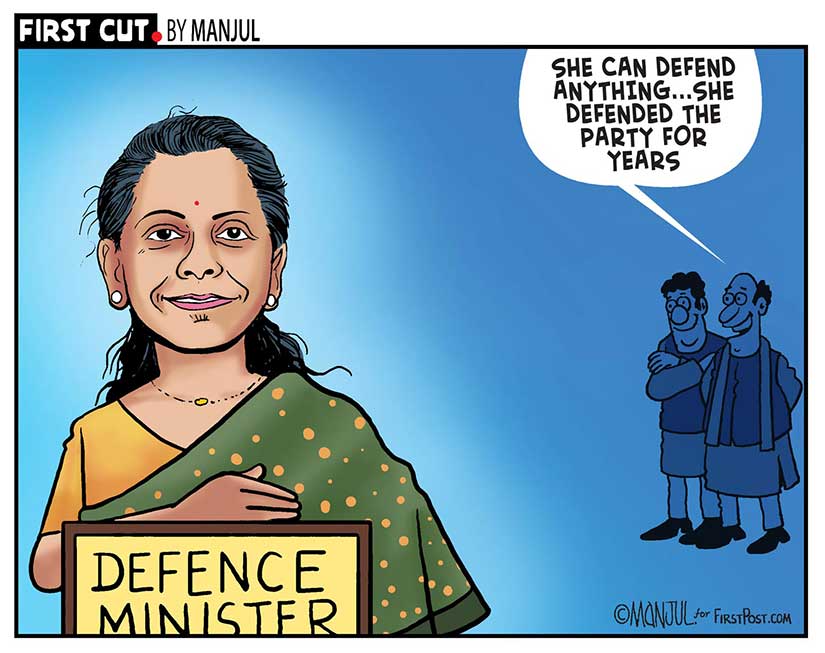The most startling aspect of the Narendra Modi Cabinet reshuffle is that a minister who has just been promoted to Cabinet rank has been given the defence portfolio. It normally goes to one of the most senior politicians in the government, but the new defence minister, Nirmala Sitharaman, is listed just above the minister for minority affairs at the bottom of the list of Cabinet ministers. It is a risky gambit. For, the need to gird up the defence preparedness has been widely felt in the wake of China’s belligerence over the Doka La stand-off, which ended amid tremendous tension just about three days before the reshuffle. Metaphorically speaking, the defence minister will need to move mountains. [caption id=“attachment_2429204” align=“alignleft” width=“380”] File image of Nirmala Sitharaman. Firstpost[/caption] The country needs a defence minister who can pull together the cooperation and goodwill of the entire government, the forces, and other stakeholders, including the Opposition corporates. The unavoidable fact of high politics is that it’s a field for the ambitious. A Lal Bahadur Shastri who gave up power or an Atal Bihari Vajpayee who allowed Lal Krishna Advani to overshadow him is a relatively rare sort of politician. One must hope that her lack of experience and general acceptance as a senior minister does not hobble her efforts to gear up India’s defences at such a critical juncture. The positives Sitharaman’s experience as commerce minister will help since she must deal with major foreign powers to make urgent procurements over the next few months. That process is already underway, for the recent Chinese belligerence underlined the urgency of defence procurement and development of infrastructure near the borders. Sitharaman’s excellent links across the world were visible while she held charge of commerce. She handled the H1-B visa issue with the US in recent weeks. These links will no doubt be very useful as defence preparedness moves into a high gear. Her links in the US will be even more useful in the light of the India-US cooperation on Afghanistan and larger strategic partnerships of which US president Donald Trump spoke about a week ago. Perhaps, it will fall as much to Sitharaman as to National Security Advisor Ajit Doval or external affairs minister Sushma Swaraj to translate that speech into practical steps for cooperative action. [caption id=“attachment_4004569” align=“alignnone” width=“825”]
 Cartoon by Manjul[/caption] Singular power Sitharaman’s appointment underlines the extent to which Modi now acts as the singular power in charge of the country. Even at the height of her power in the 1970s, Indira Gandhi appointed heavyweights like Jagjivan Ram, a potential rival for power, as defence minister. Indira, her son Rajiv Gandhi, VP Singh, Chandra Shekhar, and PV Narasimha Rao are among the prime ministers who held the defence portfolio directly for a part of their tenure. At other times, it was a dual charge with heavyweights like Jaswant Singh and Arun Jetley. R Venkatraman, George Fernandes, and Sharad Pawar are among others who have held the defence portfolio. Venkatraman went to become vice-president and then president. Fernandes was the convenor of the NDA, and third only to Vajpayee and Advani in that government. And Pawar was an obvious rival to Rao for the top job. This reshuffle has put other senior ministers on notice that Modi alone is the boss more than any earlier prime minister. They must not think of a collegiate cabinet. While picking Sitharaman, Modi apparently consulted only his long-time confidant, and BJP president, Amit Shah. Not only was Shah the only one consulted, he was also seated beside Modi during the induction ceremony for the new ministers. Speaker Sumitra Mahajan had the equivalent chair across the aisle. PMO coordination Sitharaman too will have to work closely with the Prime Minister’s Office. No doubt Doval will continue to play a key role in coordinating between all defence stakeholders. He has had a particularly good working relationship with army chief General BS Rawat ever since the latter was deputy chief of staff. In the light of Chinese belligerence, the interaction between the top echelons of the army and the rest of the government has become more intense over the past few months. In case the China-Pakistan axis ups the ante, the Indian Air Force and the Indian Navy too could become very important elements of India’s national response. It is the PMO that will have to smoothen expenditure decisions, in case the finance ministry has queries about procurement and construction related decisions by the defence ministry.
Nirmala Sitharaman’s excellent links across the world and experience as commerce minister will be very useful as India’s defence preparedness moves into a high gear
David Devadas is an expert on politics and geopolitics. Formerly a Senior Fellow at the Nehru Memorial Museum and Library, Visiting Professor at Jamia Millia Islamia, and Political Editor of Business Standard, he is currently Distinguished Fellow at the Institute for Social Sciences. He has written books on Kashmir, on youth, and on history. He has been a radio compere, guest faculty at JNU's Academic Staff College, St Stephen's College and Hindu College. He has worked for the Indian Express, The Hindustan Times, India Today, The Economic Times and Gulf News. His most impactful article, on a murder cover-up, prevented a Congress President from becoming prime minister. One led to the closure of an airline, and another created a furore and consequent clean-up in Delhi's health department. Several have correctly predicted election results in key states, and a series of reports from Srinagar made the government aware of how unsettled the situation there was in 1990. He is an alumnus of St Xavier's School, St Stephen's College, and the Indian Institute of Mass Communication. He has lived for extended periods in Geneva and Berlin, and has traveled to almost 50 countries. He enjoys various kinds of music, theatre, design, architecture and art. see more


)




